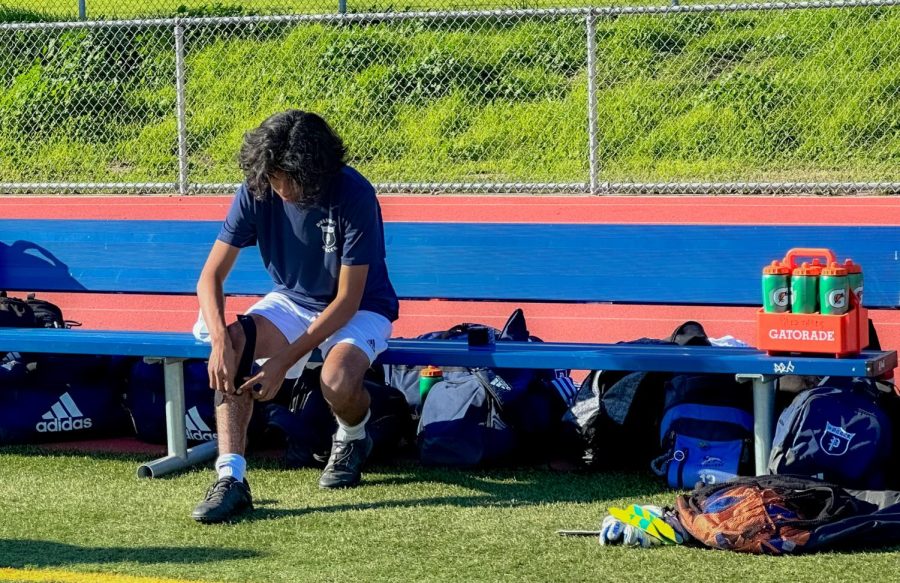Constant Juggling Act: Student-Athletes Work Hard to Avoid Dropping the Ball
January 23, 2023
Pali’s student athletic policies aim to help student athletes maintain a healthy balance between their academic and athletic pursuits. Despite these requirements, many students find themselves having to make difficult choices.
In order to participate on a Pali sports team, athletes must maintain a minimum 2.0 grade-point average (GPA), have passed a minimum of 20 units during the previous grading period and be passing 20 units of the current grading period. According to the Pali website, they must also continue enrollment in a minimum of four courses per semester and have athletic clearance from the school.
Pali’s athletic department aims to “develop the student-athlete academically, socially, physically and athletically through the pursuit of athletic excellence,” according to the Parent/Student Handbook. These values are reflected in the eligibility requirements, which are designed to encourage athletes to prioritize their education and classes over their athletics, sometimes at the expense of their ability to participate in sports teams.
Along with the GPA requirements, athletes who violate procedures around prohibited substances are subject to school and athletic consequences. The first offense results in suspension from 20 percent of a season’s games. After a second offense, students are permanently removed from the athletics program as a whole, according to the Parent/Student Handbook.
Despite the consequences, many students and faculty, including track and field coach Claudius Shropshire, agree that these policies are necessary to maintain the success of Pali’s athletes.
“The main reason that [students] are in school is for education, and [sports] are an extracurricular that is supposed to help, in my opinion, balance their life and give them something that has them competing and striving to do better,” Shropshire said.
Shropshire, who has served as the head coach of the track and field team for six years, said that the academic requirements in the athletic policies rarely affect his team.
“Usually I have the opposite problem where students want to study too much, and they can’t balance workouts with studying,” he added.
Shropshire said that students should prioritize their education, viewing their athletic obligations as secondary.
“I don’t think it’s challenging enough to get a C in most classes, you really don’t have to do a whole lot,” Shropshire said. “When I talk to the better students, they say that they can get a C without even studying. A 2.0 is really not asking for too much.”
Sophomore and varsity girls volleyball player Hazel Irving agrees that the athletic policies are not excessive.
“I think the policy of having a GPA over 2.0 is a good policy,” she said. “I feel like that’s a reasonable thing; most people should be able to keep their GPA over that.”
However, Irving said that teachers should provide additional support for student athletes.
“I feel like a teacher should be proud to have a student that plays a sport in their class,” she added. “It’s kind of shocking just how many teachers kind of make it feel like it’s bad to be an athlete or it’s a liability, like something that’s just extra work for them.”
Most Pali sports teams have demanding schedules with practices for multiple hours after school and games during the week and on weekends. This often makes balancing homework and assignments harder for athletes to manage.
Junior Varsity soccer player Nico De La Cruz, a sophomore, agrees that teachers should be more accommodating to athletes when it comes to leaving early for games and missing office hours.
“When you have to leave early, you have to either sacrifice another class or stay after school,” De La Cruz said. “I think that [teachers] have to be more understanding that the student has another priority. And, they have to kind of help them out to sort of fit that into the schedule.”
Additionally, with practices immediately after school as a seventh period, athletes are unable to attend their teachers’ office hours. De La Cruz, who has soccer practice every day after school, is one of the many students who is unable to attend his teachers’ seventh period office hours or tutoring.
“I wanted to stay at a seventh-period class with a teacher that doesn’t do office hours during lunch, but I couldn’t because of practice,” De La Cruz said. “It was just a really tough decision to choose between both of them.”
Despite some athletes’ scheduling conflicts, Shropshire maintains that academics should remain a top priority for student athletes.
“For the most part, I think if you’re not here to be a student, you shouldn’t have the privilege to be on a team,” Shropshire said. “The team is extra; the team is something that should be fun and exciting to do.”














